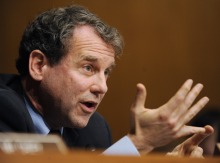Sherrod Brown: Corporate responsibility crusader
Sherrod Brown: Corporate responsibility crusader
Brown came out earlier this month, blasting JPMorgan Chase’s trading mess in which risky ventures cost the bank $2 billion in losses. Controlled by CEO Jaime Daimon, who was the financial super-start largely blamed with the staggering failure, Brown points to something else. A bank as large as JPMorgan Chase, which was one of the banks that received federal bailout money in 2008, may be able to absorb such an incredible loss. However, that says something in and of itself. In Brown’s words, “These banks aren’t just too big to fail, they’re too big to manage.” His logic is that if Jaime Dimon, who was an outspoken critic of the Dodd-Frank bill and is considered one of the best financial executives in the world, can’t manage one of these banks, who can?
Brown has recently reintroduced legislation that will force the largest banks in the country to shrink, unrolling the many conglomerate arms of these financial giants. The bill was defeated in 2010, during the Dodd-Frank battle with banking lobbies. Still, Brown told ThinkProgress that he feels positive about its reintroduction.
In related news, Brown also urged Barack Obama for more transparency on the under-the-table negotiations surrounding the Trans-Pacific Partnership (TPP), being called “NAFTA for Asia.” The trade deal, according to recently leaked documents, would promote a kind of free-for-all in the U.S. for foreign corporations while domestic corporations would still be bound by all regulatory policies. It provided a clearly articulated “appeal” process by which foreign corporations could bypass regulations in international trade with the U.S.. Brown, who has been a strong opponent of NAFTA-style trade deals, is concerned with the ability of these multinationals being able to circumvent health and safety regulations for U.S. consumers, and is demanding more transparency by the administration and affiliated federal agencies as the talks proceed.
In an era where government is seen as largely complicit in corporate irresponsibility, there are a few legislators, like Senator Brown, that are working to promote consumer protections, regulatory fairness, and the stability and well-being of our economic system overall. It’s imperative that these individuals receive voters’ support, so they can continue to safeguard the rest of us.


